Social work students simulate aging to develop compassion, empathy for the elderly
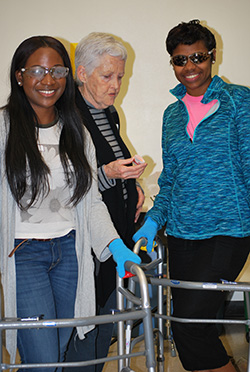 As the world population increasing ages, the needs of the elderly must be met by social workers and those involved with public policy in a way that carries empathy, understanding, skill, and passion.
As the world population increasing ages, the needs of the elderly must be met by social workers and those involved with public policy in a way that carries empathy, understanding, skill, and passion.
Rising to meet this emerging global challenge, social work majors at Lamar University gathered on Wednesday, February 17 to experience first-hand many of the trials facing the aging population by simulating the process of aging themselves.
In the next 40 years, the worldwide population of persons aged 65 or more will double, impacting the global economy, health care, housing, migration trends, and voting patterns. For the first time in human history, there will be more people aged 65 and older than 5 and younger. In the United States alone, 10,000 Baby Boomers turn 65 every day. An expected 400 percent increase in chronic, degenerative disease is expected with costly long-term care presented a huge economic strain on families, communities and government budgets.
“During this global population event, often referred to as the Silver Tsunami, the percentage of elderly will burgeon, but the workforce will shrink,” said Nan Nelson, adjunct professor of social work. “Social workers are trained to work on all levels of the system; with the individual, the family, the social structure and policymaking through government. There’s a vast wealth of knowledge about these things—one can read books, conduct research, browse online—but nobody can really know what it feels like to have dementia or cataracts unless they’re in that person’s shoes. So in essence, today is about teaching future social workers what being 70 or over feels like, and through that, teaching empathy.”
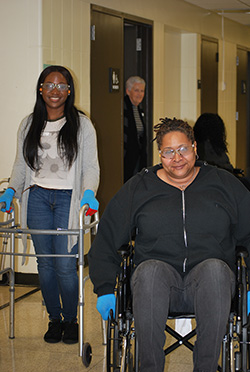 Student participants were able to cycle through a variety of activities aimed at helping them understand the unique set of challenges the elderly face on a daily basis, such as listening to their doctor with impaired hearing and cognitive ability, sorting medication with poor vision and coordination, using public transportation while reliant on equipment such as wheelchairs, walkers, and canes, purchasing a medicare plan under a tight budget and writing an advance directive for end of life care.
Student participants were able to cycle through a variety of activities aimed at helping them understand the unique set of challenges the elderly face on a daily basis, such as listening to their doctor with impaired hearing and cognitive ability, sorting medication with poor vision and coordination, using public transportation while reliant on equipment such as wheelchairs, walkers, and canes, purchasing a medicare plan under a tight budget and writing an advance directive for end of life care.
These activities were followed by self-examinations in which students pondered complex questions ranging from “What discomfort, physical or emotional, did you experience?” or “How did you feel about having to ask for help?” to “Reflect on the successes and satisfactions in your life, and the failures and regrets,” and “Is there anybody you need to forgive or be forgiven by? Don’t forget yourself.” At the close of the program, students wrote letters to their “children” outlining how they’d want to be remembered. Then, they wrote their epitaphs.
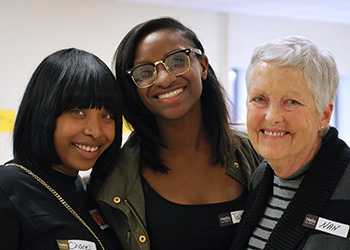 As the students cycled through the different activities, they realized just how challenging seemingly simple tasks could be after 70, especially with the added strain of illness or dementia.
As the students cycled through the different activities, they realized just how challenging seemingly simple tasks could be after 70, especially with the added strain of illness or dementia.
“For me, sorting and taking the pills was especially challenging. We had to wear heavy gloves and we could barely see,” participant Chanel Matthews said.
“Yes. We couldn’t see, we couldn’t even write. I think we definitely got a taste of what real life can be like for the elderly,” said social work student Takaisia Minex, adding onto Matthews’ sentiment. “If I were actually aging like [the simulation], I feel like I’d have to get my grandkids or somebody to do everything for me.”
Students were equipped with ill fitting, bulky shoes, vision impairment goggles, thick jackets, earplugs and mobility devices as they had to navigate daily activities and deeper matters of life and legacy, sometimes with the added burden of isolation or embarrassment in their present state. However, Nelson also recognizes the great power of memory sharing and the deepening spirituality that come with aging.
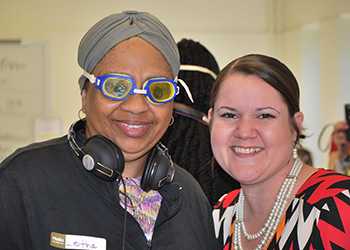 “A lot of students have approached me and said, ‘you know, I really didn’t know this. I didn’t realize this is what it was like to age at all,’” Nelson said. “And that’s important, because when events like this end and the students take off their simulation gear, they can go home and return to their regular lives. Somebody with dementia can’t ‘take it off.’ This is their life.”
“A lot of students have approached me and said, ‘you know, I really didn’t know this. I didn’t realize this is what it was like to age at all,’” Nelson said. “And that’s important, because when events like this end and the students take off their simulation gear, they can go home and return to their regular lives. Somebody with dementia can’t ‘take it off.’ This is their life.”
Nelson hopes that the aging simulation coupled with future awareness efforts will drive more empathetic young minds to geriatric and palliative care to meet the needs of an aging population.
“I hope students will develop their awareness and sense of kindness and compassion. There’s absolutely an unmet need for students going into geriatric and palliative care,” she said. “The science supporting global aging is there and it’s impossible to ignore because population grows geometrically, not arithmetically. We’re going to have a huge problem very soon, because to meet the needs of the Silver Tsunami, more social workers and medical professionals need to start specializing in this kind of care now.”
Similarly, she believes that to combat these problems actively, other solutions must be considered—such as building or repurposing villages to serve as places where residents can age-in-place together, or encouraging the elderly to rent out cheap rooms in their homes to young people in exchange for their companionship and occasional assistance.
“There just aren’t enough long-term care facilities and we can’t overflow their capacity for care. That’s when problems happen,” Nelson said. “I always tell people that I’m going to have a few of my students live with me one day. I honestly think it’s a great plan.”
Beyond building empathy in social work students, Nelson and other faculty within the Department of Sociology, Social Work and Criminal Justice hope that the simulation will draw more attention to social work as a field.
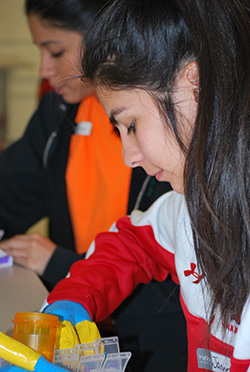 “My hope through this, beyond developing empathy, is that the community can realize the vast nature of social work. The stigma that frames it to be solely about helping children in problematic homes couldn’t be further from the truth,” said Ginger Gummelt, assistant professor of social work. “Social work is aimed at improving the lives of everyone through a great many means.”
“My hope through this, beyond developing empathy, is that the community can realize the vast nature of social work. The stigma that frames it to be solely about helping children in problematic homes couldn’t be further from the truth,” said Ginger Gummelt, assistant professor of social work. “Social work is aimed at improving the lives of everyone through a great many means.”
Nelson mirrors this.
“Some people may not know this, but social workers are particularly primed to deal with politics, policy change, lobbying, and so on so that marginalized groups like the elderly might have a stronger voice speaking for them when they cannot,” she said. “And through programs like the aging simulation, social workers might be better equipped with both knowledge and skill for meeting the spiritual, social, and physical needs of the elderly and to advocate for public policy on their behalf.”


